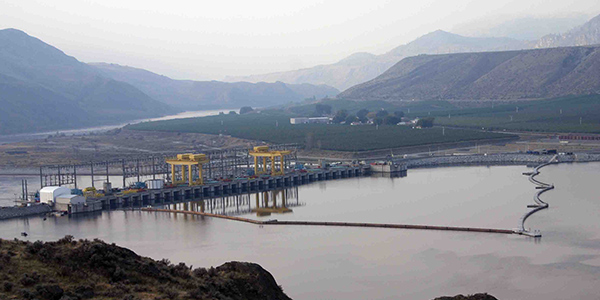Construction of Washington’s first hydrogen production facility began earlier this month just outside of East Wenatchee.
Using power from the 840-MW Wells Dam 50 miles upstream on the Columbia River, the plant is expected to start production in November to eventually provide renewable hydrogen for the state’s first hydrogen fuel-cell vehicles (FCEVs). The state’s first hydrogen recharging station is earmarked for southwestern Washington.
State Sen. Brad Hawkins (R) wants to appropriate money for two more hydrogen fuel-cell stations in his central Washington district in a legislative transportation package that will likely be nailed down in April.
The $20 million plant is expected to produce two tons of hydrogen per day with plans to expand when more output is needed, said Meaghan Vibbert, spokesperson for the Douglas County Public Utility District, which owns the plant and dam.
The idea for the plant came from global warming melting Cascade Range snowpack too early in the spring, sending more water barreling toward the Wells Dam. That means the dam and its sister dams on the river produce more electricity than the Northwest wholesale market can absorb, leaving Douglas PUD to pay other utilities to accept the excess power.
The PUD’s alternative is to spill the extra water over the top of the dam, which would create nitrogen bubbles that kill fish.
Consequently, Douglas PUD decided to build the hydrogen plant to make use of its surplus energy, Vibbert said. The electricity and water taken from the Columbia River are to be sent to the plant where a hydrogen electrolyzer — to be installed in July — would separate the hydrogen to be stored and oxygen to be released into the air. The hydrogen would be compressed into tanks and then shipped by tanker trucks to future customers.
The project is aided by a Hawkins bill passed in 2019 that allows Washington PUDs to manufacture and distribute hydrogen.
The PUD currently does not have any signed contracts for the plant’s output but is in discussions with some potential customers, Vibbert said.
Meanwhile, another Hawkins bill (SB 5000) unanimously passed the Washington Senate on March 3 to apply a partial sales tax exemption to hydrogen FCEVs, which range in price from $34,000 to $58,000. The bill is now in the House Finance Committee. (See Strong Bipartisan Support for Wash. FCEV Bill.)
The exemption would only apply to new vehicles, and after eight years, it would be re-evaluated.




